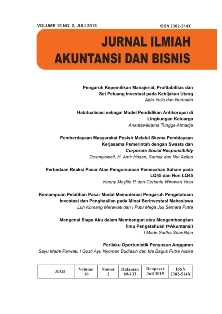HABITUALISASI SEBAGAI MODEL PENDIDIKAN ANTIKORUPSI DI LINGKUNGAN KELUARGA
Abstract
Lembaga Perkreditan Desa (LPD) is a financial institution owned by villagers in Bali. This financial institutions have showed success in improving the community’s economy for its ability in combining a modern organization and social capital belonged to Balinese. This is demonstrated by the strong internal control structure of LPD supported by villages’ regulations such as awig awig and perarem. However, this unification is not always successful. There is also an LPD which went bankrupt due to corruption by its management. This condition resulted the emergence of alternative thought that fighting corruption should be done through anti-corruption education in the family. By reflecting on the bankruptcy ofLPD Desa Pakraman Bontihing, Kubutambahan district, Buleleng, Bali, this article will outline the ideas that focus on educational efforts in the family to create an anti-corruption generation. This is very important because the family is the first and main center of education for the establishment of
noble characters, including the character of anti-corruption. Achievement of this goal requires a model of education, such as habitualization conducted by the children with the guidance and supervision of their parents.
Downloads
Download data is not yet available.
How to Cite
ATMADJA, Anantawikrama Tungga.
HABITUALISASI SEBAGAI MODEL PENDIDIKAN ANTIKORUPSI DI LINGKUNGAN KELUARGA.
Jurnal Ilmiah Akuntansi dan Bisnis, [S.l.], v. 10, n. 2, july 2015.
ISSN 2303-1018.
Available at: <https://ojs.unud.ac.id/index.php/jiab/article/view/16822>. Date accessed: 20 feb. 2026.
Issue
Section
Articles
Keywords
Lembaga Perkreditan Desa, bankruptcy, internal control structure, social capital, anticorruption education




















